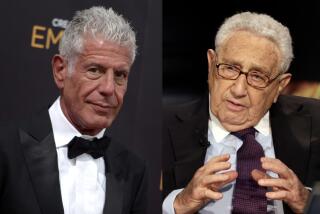Kissinger, Others See No Immediate Gains From Talks
- Share via
WASHINGTON — Former Secretary of State Henry A. Kissinger and other foreign policy experts agreed Sunday that the meetings beginning today in Geneva between Secretary of State George P. Shultz and Soviet Foreign Minister Andrei A. Gromyko are unlikely in themselves to produce substantive arms control progress but could produce agreements to hold future talks.
“I do not expect anything substantive to emerge from these two days of talks,” Kissinger said, complaining that the meetings have been the subject of extraordinary exaggeration in the news media.
“The best that can come out of these talks is a procedural agreement on how to conduct talks and towards what end,” Kissinger said. “If that can be achieved, it would be considerable progress.”
Kissinger, along with other officials of previous administrations and other foreign policy specialists, dominated the Sunday television interview shows, a reflection of the attention being given to the talks by the American news media. However, no current officials from the Reagan Administration which sent an extraordinarily large and diverse team to Switzerland with Shultz--appeared on the programs.
Lawrence S. Eagleburger, a former Kissinger deputy and a former under secretary of state for political affairs in the Reagan Administration, said on the ABC-TV program “This Week With David Brinkley” that the progress of any negotiations that may stem from the Geneva talks would hinge on the Administration’s willingness to compromise.
So far, President Reagan has shown little flexibility in the area of space weaponry, central to Soviet concerns about the U.S. arsenal.
In Eagleburger’s view, Reagan’s adherence to plans to develop a space-based missile defense system, known in the Administration as the Strategic Defense Initiative and nicknamed the “Star Wars” plan, was a factor in bringing the Soviets back to even preliminary meetings with the United States.
He said that now, however, “the question is going to be whether the Administration is going to make the kinds of compromises as the negotiations go forward that are going to be necessary if they’re going to keep the process going, and there I think the jury is still out.”
Noting that Reagan made it clear in a speech last Jan. 16 that he sought an improved relationship with the Soviet Union, Eagleburger said there is also a question of “whether the Soviet Union is capable of making the compromises that are necessary for an agreement.”
McGeorge Bundy, who was President John F. Kennedy’s national security adviser, said on the ABC program that as long as Reagan holds to the space plan, “there will not be any agreement” with the Soviets.
Under the Reagan plan, the government would spend $26 billion on research into a weapons system that would intercept enemy missiles in space, before they reach the Earth’s atmosphere. There are no plans, however, for actual deployment of such a system, and a decision on such a step would be left to a future President.
The composition of the U.S. delegation to Geneva reflects the scope of thought on arms control issues within the Administration, and Kissinger said the Administration’s position has not been made clear.
Speaking on the CBS-TV program “Face the Nation,” the former secretary of state, who negotiated long-range arms limitation agreements with the Soviets, said, “I think there is still considerable argument going on (within the Administration), and I think it will have to be adjudicated by the President.”
‘Has Come a Very Long Way’
He added that in the area of arms control, Reagan “has come a very long way when one compares his original statements on these subjects with his recent statements, and I’m actually very optimistic about these talks.”
Eagleburger said resistance offered by Defense Secretary Caspar W. Weinberger and by Richard N. Perle, assistant secretary of defense for international security policy, to previous arms control efforts could cause “a lot of difficulty.” Perle was among those who accompanied Shultz to Geneva.
Now, however, Reagan “is personally very clearly in favor of reaching sensible agreements” on arms control, he said.
“In the last analysis, the test is going to be whether the President is prepared to bang the heads that are necessary to get the bureaucracy to come to agreement itself on what we ought to be doing.”
More to Read
Sign up for Essential California
The most important California stories and recommendations in your inbox every morning.
You may occasionally receive promotional content from the Los Angeles Times.













